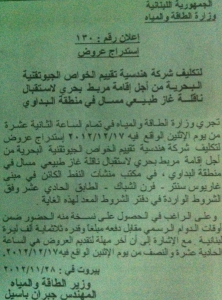Lebanon – Economic Prospects:
The Lebanese ministry of energy has to deal with complications arising from two separate projects initiated by minister Gebran Bassil: the construction of a power plant in Deir Amar and the leasing of electricity-generating ships from Turkish firm Karkey Karadeniz Elektrik Uretim.
A Spanish-Lebanese consortium, Abener-Butec, won the bid to build the power plant in Deir Amar, but Bassil later suspended the project, citing price hikes, and demanded the consortium to cut prices by around $160m and requested it to downsize the capacity of the plant from 525 MW to 450 MW or a new tender will have to be launched. But, not only does law 181 – voted by the Parliament in October 2011 to boost the country’s power generation capacity – not authorize the Minister of Energy to negotiate with the companies in his own capacity, it also does not allow major changes to the contract [Link in French]. The Spanish-Lebanese consortium has declared it is ready to reduce the cost of the project by up to 10% and threatened to take the matter to court if it was not awarded the contract.
Meanwhile, the electricity-generating ships, the first of which was expected in October 2012, have yet to be dispatched, because of problems with payment. The Energy Ministry and the Finance Ministry have been trading accusations for weeks, demonstrating a serious lack of coordination, in a government formed by supposedly political allies. Moreover, the Turkish firm that was selected to provide the ships is facing corruption allegations in Pakistan, which might complicate things further.
The handling of both affairs demonstrates the complexities of Lebanese politics and the consequences these may have on investment projects. It casts doubts on the management of future projects and tenders, particularly the next major milestone for the country’s oil and gas sector: the organization of the first licensing round for drilling rights in Lebanese waters.
Lebanon – Seismic Survey:
Spectrum ASA has started the second phase of its multi-client 3D survey, covering an area of 1200 Km2. It is expected to be completed in December 2012. The surveyed area is adjacent to the area covered during the first phase of the survey, which was completed in October 2012. Processed data will start to be available in January 2013, and a final product is expected in April 2013.
Lebanon – Request for proposals:
The Lebanese Ministry of Energy and Water issued a request for proposals on 28/11 to hire an engineering company that would be responsible of assessing the feasibility of establishing a terminal for an LNG carrier in Baddawi. Offers must be submitted by 17/12. Middle East Strategic Perspectives is reproducing the text of the request for proposals in Arabic (further details available at the office of the Ministry):

Lebanon – USA/France:
According to the Kuwaiti Al-Rai newspaper [Link in Arabic], Energy Minister Gebran Bassil and other Free Patriotic Movement (FPM) officials were in Washington lately (exact dates not provided), on a visit that aimed to convince the US administration of the need to reconsider its alliances in Lebanon. Among the incentives discussed by the delegation is the possibility to grant American companies exploration and production rights for gas in Lebanese waters. According to the same report, US officials have said that Bassil alluded to Russian and Iranian interest in Lebanese offshore resources but added that “he prefers to deal with the Americans”. The accuracy of the report cannot be confirmed but Bassil did visit the US in October 2012 and has, on several occasions, invited and encouraged American companies to be involved in the exploitation of the country’s resources. Bassil seems to believe there is an added-value to American investments or he may be thinking that, given his local political alliances, Americans need further incentives to get involved. In any case, such dynamism has not been matched in recent visits to other countries, such as his last visit to France (22-25/11). The FPM official website had published an unusually hostile article towards Total and France on 25-10 (later removed), which sought to explain the assassination of the head of the Information Branch Wissam el-Hassan, close to the March 14 camp, by providing a shady analysis on energy geopolitics and Franco-Syrian and later Franco-Lebanese cooperation in the field of oil and gas. This raises the question of the consequences that major political differences (such as those on regional issues between the political movement represented by Gebran Bassil and France) could have on investments in the oil and gas sector.
Lebanon – Israel:
The repercussions of the maritime border dispute between Lebanon and Israel are being felt on investment opportunities on both sides of the border. UPI news agency published an article on 29/11 in which it detailed the progress (or lack of) being made by Lebanon in exploiting its gas resources. Citing Globes, the Israeli business daily, it argues that border disputes and the ongoing state of war between Lebanon and Israel explain why none of the oil majors have taken concrete steps to confirm their interests in Israeli offshore resources, in contrast with politically-stable Cyprus which has managed to attract big names such as Total, Eni, Kogas, Petronas etc. This is also the case in Lebanon, where none of the major companies has explicitly declared its interest to invest in the country yet. The article also hints that the vast arsenal of missiles that Hezbollah, the Lebanese resistance group, owns may include sea-skimming Chinese-designed C-802 anti-ship weapons that could be used against Israeli offshore platforms.
